unit6复习课件
合集下载
外研版(2019)必修第一册 Unit 6 单元知识点复习 课件(共24张PPT)

efficiently within __li_m_ite_d___ (limit) time. 3.[2022·浙江1月卷]The _p_le_a_sa_nt___ (please) time we spent together was
really unforgettable. 4.[2021·北京卷]The findings show a critical need to invest in disaster
3.More and more people feel that by using natural dyes, we can remind ourselves of nature’s beauty and protect the natural world.
4.As well as being good for the environment, gardening is also good for the soul.
ancient methods of agriculture
a scenic spot
全国各地 保持做某事的传统方式
工作原理 指的是,参考,提到
用··替换 把··和···作比较
坐落于 文化景观
all over the world
keep the traditional way of doing
the working principle refer to
极目所见 从底部到顶部
费力做某事 变成,成为
平地 相当多,充足 阻止···做某事
冲掉,冲走
as far as the eye can see
from the bottom to the very top
take the trouble to do turn into
really unforgettable. 4.[2021·北京卷]The findings show a critical need to invest in disaster
3.More and more people feel that by using natural dyes, we can remind ourselves of nature’s beauty and protect the natural world.
4.As well as being good for the environment, gardening is also good for the soul.
ancient methods of agriculture
a scenic spot
全国各地 保持做某事的传统方式
工作原理 指的是,参考,提到
用··替换 把··和···作比较
坐落于 文化景观
all over the world
keep the traditional way of doing
the working principle refer to
极目所见 从底部到顶部
费力做某事 变成,成为
平地 相当多,充足 阻止···做某事
冲掉,冲走
as far as the eye can see
from the bottom to the very top
take the trouble to do turn into
Unit6单元复习课课件人教版英语九年级全册

—You _______. That really helps me a lot.
A. have a meeting
B. take a walk
C. make a mess
D. have a point
( A)2.Sorry, this is your letter, but I opened it _______.
been made invited worked learned brought invented said divided
能力提升-语法突破 Let’s try.
根据括号内所给词的适当形式填空。
1.—Your ring looks nice. —Yes, and it _w__a_s_m_a_d_e__(make)in Thailand.
Many flowers are planted by them every year. 他们每年都要种许多花。
他们去年种了许多花。 Many flowers were planted by them last year.
构成:was/were+动词的过去分词
能力提升-语法突破
Let’s think.
remain保持不变;剩余 translate翻译 divide分开 daily每日的;日常的 national 国家的;民族的 low低的;矮的 sudden突然(的) sour酸的;有酸味的 nearly几乎 smell气味 trade贸易;交易 doubt疑惑;疑问 Canadian 加拿大的;加拿大人的
Name:basketball Time:1891 Inventor:James Naismith
Name:potato chips Time:1853 Inventor:George Crum
人教版英语九年级全册Unit6复习课件

e.g. My aunt gave me an e-dictionary yesterday. I was given an e-dictionary yesterday. An e-dictionary was given to me yesterday.
3. 主动句中感官动词see / hear / watch / feel等和使役动词make / let / have等后 跟省略to的动词不定式,变为被动语态 时应加上不定式符号to。
She was thinking about her childhood days. 她正回想她的童年时期。
【拓展有关think的短语】 think of 指“考虑, 记忆, 记起” e.g. You think of everything!
你全都提到了。
I can’t think of his name at the moment. 我一时想不起他的名字。
The classroom was cleaned yesterday. 教室昨天被打扫。 (被动语态,主语the classroom是clean这一 动作的承受者)
一、一般过去时被动语态 一般过去时被动语态的结构为“主语+ was /were +及物动词的过去分词(+by+动作的执 行者).”。如:
e.g. I saw a heavy man enter the house. A heavy man was seen to enter the house.
4. 系动词、不及物动词或某些短语动词 (happen, take place, come true, fall asleep…)没有被动语态。
e.g. This computer is used to control all the machines. 这台电脑是用 来控制所有机器的。
3. 主动句中感官动词see / hear / watch / feel等和使役动词make / let / have等后 跟省略to的动词不定式,变为被动语态 时应加上不定式符号to。
She was thinking about her childhood days. 她正回想她的童年时期。
【拓展有关think的短语】 think of 指“考虑, 记忆, 记起” e.g. You think of everything!
你全都提到了。
I can’t think of his name at the moment. 我一时想不起他的名字。
The classroom was cleaned yesterday. 教室昨天被打扫。 (被动语态,主语the classroom是clean这一 动作的承受者)
一、一般过去时被动语态 一般过去时被动语态的结构为“主语+ was /were +及物动词的过去分词(+by+动作的执 行者).”。如:
e.g. I saw a heavy man enter the house. A heavy man was seen to enter the house.
4. 系动词、不及物动词或某些短语动词 (happen, take place, come true, fall asleep…)没有被动语态。
e.g. This computer is used to control all the machines. 这台电脑是用 来控制所有机器的。
人教版英语八年级上册 Unit 6 复习课件

improvement
5. 培养一种业余爱好 5. take up a hobby/doing
6. 制作周计划
6. make a weekly plan
7. 太困难以至于不能 7. too difficult to keep
坚持
8. 由于这个原因
8. for this reason
9. Sometimes the resolutions may be too
there be 句型的将来时结构 there is/are going to/will be
有某事将要发生
用be going to 改写句子 There will be a tall building soon. There is going to be a tall building soon.
1.一种承诺 2.对某人做出承诺 3.在……的开端 4.做某事的时间 5.改善我们的生活 6.为来年做计划
7.写下 8. 告诉某人某事 9.搬到….
1.a kind of promise 2.make promises to sb. 3.at the beginning of 4.a time for doing sth. 5.improve our lives 6.plans for the coming year 7.write (it/them)down 8.tell sb. about sth.
match
D. take between Class 1
up it and Class
3
tomorrow.
A. is going to
B. is going to be
C. is going to have
( D)14. I’m reading a book
Unit 6 (单元复习课件)-七年级英语上册(人教新目标Go for it!)

他们喜欢草莓吗?不,他们不喜欢。 _D_o_t_h_ey_ _li_ke_ _s_tr_a_w_b_e_rr_ie_s_?_ _N_o_,t_h_e_y_d_o_n_’t_. _ _ _
➢ 三单:Does+主语+like+宾语? Yes,主语代词 does./No,主语代词
doesn’t. John喜欢他们吗?不,他不喜欢。 _D_o_es_ _J_o_h_n_li_k_e_t_h_em_ _?_ N_ _o_,_h_e_ d_o_e_s_n_’_t._ _ _ _ _ _ _ _ _ _ _ _ _
那么;所以,如此的____s_o________ 早餐___b__re__a_k_fa__st______ 作为早餐__fo__r_b__r_e_a__k_f_a_st 午餐___lu_n__c_h______ 午餐后_a_f_t_e_r_l_u_n_c_h____ 明星;星星 ___s_t_a_r_______
11. 晚餐后
____a_ft_e_r_d_i_n_n_e_r___
12. 我不想变胖。_I_d__o_n_’t_w__a_n_t_t_o_b_e__fa_t_._
03 Sentences
Sentences
Jack: Hey, John’s birthday dinner is next week. Let’s think about the food.
Cindy: I love fruit. I think it's healthy.
某人某餐喜欢吃什么?
David: OK. So what fruit do you like? Do you like bananas? 你喜欢吃什么水果?
Cindy: Well, I don't like bananas. But I like oranges and apples.
➢ 三单:Does+主语+like+宾语? Yes,主语代词 does./No,主语代词
doesn’t. John喜欢他们吗?不,他不喜欢。 _D_o_es_ _J_o_h_n_li_k_e_t_h_em_ _?_ N_ _o_,_h_e_ d_o_e_s_n_’_t._ _ _ _ _ _ _ _ _ _ _ _ _
那么;所以,如此的____s_o________ 早餐___b__re__a_k_fa__st______ 作为早餐__fo__r_b__r_e_a__k_f_a_st 午餐___lu_n__c_h______ 午餐后_a_f_t_e_r_l_u_n_c_h____ 明星;星星 ___s_t_a_r_______
11. 晚餐后
____a_ft_e_r_d_i_n_n_e_r___
12. 我不想变胖。_I_d__o_n_’t_w__a_n_t_t_o_b_e__fa_t_._
03 Sentences
Sentences
Jack: Hey, John’s birthday dinner is next week. Let’s think about the food.
Cindy: I love fruit. I think it's healthy.
某人某餐喜欢吃什么?
David: OK. So what fruit do you like? Do you like bananas? 你喜欢吃什么水果?
Cindy: Well, I don't like bananas. But I like oranges and apples.
人教版英语八年级上册Unit6复习课件

grow up be sure about make sure keep on doing sth try one’s best to do be able to write down at the beginning of from the beginning 从一开始 from beginning to end 从头到尾
N. make a promise 许下诺言 break a promise 违背诺言 keep a promise 信守诺言 eg: Once you make a promise to others, you should try your best to keep it. 一旦你对别人许下诺言,你就应该尽最大努力信守承诺。 I got ang背诺言时,我生气了。
• v. cook sb. sth.=cook sth. for sb. 给某人做某物 eg: She always cooks us delicious food. =She always cooks delicious food for us.
• cooker 作名词,意为“厨具”。 eg: All the cookers in the kitchen are new.
4. 特殊用法 1)be going to +不定式,表示将来。表示打算、准备做的事或即将发 生或肯定要发生的事。和will相比,be going to通常表示主观,will通常 表示客观。 eg: What are you going to do tomorrow? 明天你要做什么?
Look at the dark clouds, there is going to be a storm. 看看这些黑云,将有一场暴风雨。 He will be twenty years old.
Unit6(单元复习课件)九年级英语全一册(人教版)
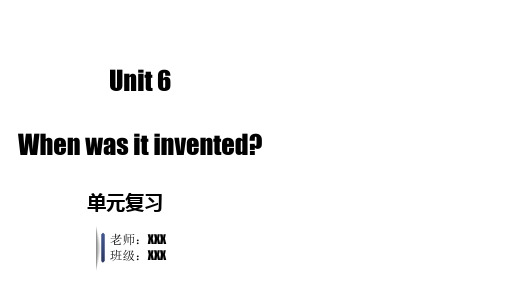
一般过去时的被动语态的构成为:
_w__a_s__/_w__e__r_e___+及物动词的过____去___分___词___。
Grammar
一般过去时被动语态的句式
句式
结构
例句
肯定句 主语+ was/ were +过去分词 He was chosen to work for the
+其他.
village.
used for? 特殊疑问句
形式
ice-cream.
Active Voice: Alexander Graham Bell invented the telephone in 1876.
Passive Voice: The telephone was invented (by Alexander Graham Bell) in 1876.
Grammar
1.主动语态变被动语态
主动变被动
Alexander Graham Bell invented the telephone in 1876.
The telephone was invented by Alexander Graham Bell in 1876.
原宾语变被动的主语,原主语变被动的宾语, 谓语动词由过去式变be+谓语动词的过去分词, 加之by引导
Who was it invented by? When was tea brought to Korea?
It was invented by Whitcomb Judson.
It was brought to Korea during the 6th and 7th centuries.
What is the hot ice-cream scoop
_w__a_s__/_w__e__r_e___+及物动词的过____去___分___词___。
Grammar
一般过去时被动语态的句式
句式
结构
例句
肯定句 主语+ was/ were +过去分词 He was chosen to work for the
+其他.
village.
used for? 特殊疑问句
形式
ice-cream.
Active Voice: Alexander Graham Bell invented the telephone in 1876.
Passive Voice: The telephone was invented (by Alexander Graham Bell) in 1876.
Grammar
1.主动语态变被动语态
主动变被动
Alexander Graham Bell invented the telephone in 1876.
The telephone was invented by Alexander Graham Bell in 1876.
原宾语变被动的主语,原主语变被动的宾语, 谓语动词由过去式变be+谓语动词的过去分词, 加之by引导
Who was it invented by? When was tea brought to Korea?
It was invented by Whitcomb Judson.
It was brought to Korea during the 6th and 7th centuries.
What is the hot ice-cream scoop
人教版九年级上Unit 6期末复习课件(共18张)
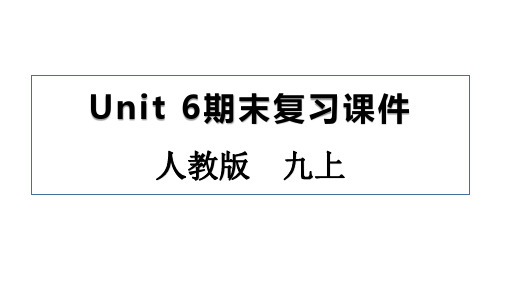
Sentences
It's said that a Chinese ruler called Shen Nong was the first to discover tea as a drink. It's said that据说 It's believed that据认为 It's reported that据报道 It's expected that据预计 It's known that众所周知
Unit 6期末复习课件 人教版 九上
Words
鞋跟 勺 电 款式 工程 高兴 拉链
heel
每日的
scoop 有道理
electricity 网站
style
先锋
project 列表
pleasure 提到
zipper 意外的
dialy have a point website pioneer list mention accidental
Sentences
Some leaves from a tea plant fell into the water and remained there
for some time. fall into落入 remain的用法:做系动词,后面跟形容词,保持某种状态 做不及物动词,后面跟介词短语
--The plane___on the ground for two more hours because of it.
顾客
customer 钦佩
look up to
奥林匹克运动 the Olympics 英雄
hero
加拿大的
Canadian 职业的
professional
Unit 6 单元复习课件-七年级英语下册同步备课系列(人教新目标Go for it!)

What about you? Jenny: I’m watching TV. Do you want to join me for dinner?
My parents aren’t at home. We can eat out. Laura: Yeah. I’d love to. Jenny: Let’s meet at my home first. Come at half past six. Laura: OK. See you then.
Words
10. 儿童 n. _c_h_il_d_____ 11. 可口的,美味的 adj. _d_e_l_ic_i_o_u_s 12. 房子 n. __h_o_u_s_e____ 13.希望 v. __w__is_h__ 14.出去吃 __e_a_t_o_u_t__ 15.男人,人 n. ___m_a_n____ 16.一个...另一个...__o_n__e._.._t_h_e_o_t_h_er... 17.一些...另一些..._s_o_m__e_.._.o_t_h_e_r_s_.._. 18.美国__A_m__e_r_ic_a
He isn’t reading the newspaper. 他没在看报纸。
Be (Am, Is, Are) + 主语 + v-
ing + 其他?
一般 疑问句
肯定回答:Yes, + 主语 + be.
否定回答:No, + 主语 + be
+ not.
—Are they playing soccer? 他们在踢足球吗? —Yes, they are./ No, they aren’t. 是的,他们在踢。/不,他们没在踢。
My parents aren’t at home. We can eat out. Laura: Yeah. I’d love to. Jenny: Let’s meet at my home first. Come at half past six. Laura: OK. See you then.
Words
10. 儿童 n. _c_h_il_d_____ 11. 可口的,美味的 adj. _d_e_l_ic_i_o_u_s 12. 房子 n. __h_o_u_s_e____ 13.希望 v. __w__is_h__ 14.出去吃 __e_a_t_o_u_t__ 15.男人,人 n. ___m_a_n____ 16.一个...另一个...__o_n__e._.._t_h_e_o_t_h_er... 17.一些...另一些..._s_o_m__e_.._.o_t_h_e_r_s_.._. 18.美国__A_m__e_r_ic_a
He isn’t reading the newspaper. 他没在看报纸。
Be (Am, Is, Are) + 主语 + v-
ing + 其他?
一般 疑问句
肯定回答:Yes, + 主语 + be.
否定回答:No, + 主语 + be
+ not.
—Are they playing soccer? 他们在踢足球吗? —Yes, they are./ No, they aren’t. 是的,他们在踢。/不,他们没在踢。
牛津译林九年级英语上册Unit 6 中考复习课件(共29张)

Would you like to be his new partners ?
If you want to be a good host, you must know many words and phrases.
1 喜剧
comedy
2 纪录片 documentary
3 对话
dialogue
4 最新的 up-to-date
3. 直到最后,你才能找到答案。
You will not find out the answer until the very end.
4. 如果你喜欢解谜,你可能喜欢这部电影。
If you enjoy solving mysteries, you might like this film.
Talk about the programme with the given phrases
A. is fine, will rain
B. will be fine, rains
C. will be fine, will rain D. is fine; rains
A good host should have the ability of writing and speaking.
TV viewing habits
If we don’t give out leaflets in public, people will not know our programme.
Unless we give out leaflets in public, people will not know our programme.
watch … every week? • B: …
If you want to be a good host, you will be able to create a new TV programme.
Unit 6【复习课件】-2022-2023学年七年级英语下册单元复习过过过(牛津译林版)
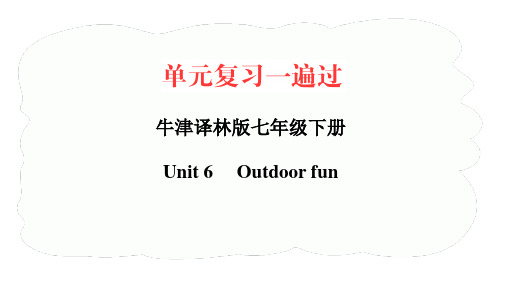
C. visited
D. visit
【解析】本题用语法判定法。考查动词时态。句意:—你 曾经参观过沈阳世博园吗?—是的,我去年参观它的。由 答句中“last year”可知,答句是一般过去时。故选C。
中考在线:—Alice has gone out.
—Oh, has she? What time _C_____ she ______?
他们担心他们的工作吗? —Yes, they were. / No, they weren’t.
是的, 他们担心。/ 不, 他们不担心。
中考在线:—My feelings for you have not changed.
—But you have changed. You are not as youB_____.
A. are
B. were
C. will be
D. have been
【解析】考查动词时态。根据答语的前句句意“但是你已 经变了”可知,后句表述“你不像你以前那样了”,用一 般过去时。故选B。
一、用所给词的适当形式填空
1. Just now, he got a call and __h_u_r_ri_e_d__ (hurry) home. 2. Miss Li __t_a_u_g_h_t__ (teach) Chinese in London 3 years ago. 3. I ___w_e_n_t___ (go) swimming last Sunday, and I _d_i_d_n_’_t_g_o_
door... 很快爱丽丝个子足够小可以穿过那个门……
一般过去时( 二)
考点1 行为动词的一般过去时的肯定句、否定句、一般疑问句及其肯、 否定回答。具体构成如下: 1) 肯定句: 主语+ 动词(过去式) + 其他. e.g. They had a picnic in the park last week. 上周他们在公园里野餐。 2) 否定句: 主语+did not+ 动词( 原形) + 其他. (did not= didn’t) e.g. We didn’t have classes yesterday. 我们昨天没有课。
Unit6Survival单元复习课件-高中英语选择性

communication.
12.According to a recent study in the Journal of Consumer Research, both the size and consumption (consume) habits of our eating companions can influence our food intake.
使……处于控制之下 应付 摆脱 彻底摧毁,消灭 由……构成,由……组成 在此期间,与此同时
四、经典句式 1.“only+状语”置于句首引起的部分倒装句
Only then can we look towards (我们才能展望) harmoniously sharing our urban habitats. 2.动词不定式短语作表语 One option is to explore other planets (探索其他星球) to see if we could live on them. 3.替代词 The most likely choice is Mars, which is relatively close to Earth and has an environment less hostile than that of other planets (其他行星的环境).
濒危物种名录 登陆月球 地球的大气层 火山喷发 适应变化 季节性迁徙 寻找生命迹象 宇宙的起源 一项科学发现 主要食物来源 拍摄地球的照片
20.send more satellites into space 21.immune system 22.reduce the power to resist disease 23.send unmanned spacecraft to Mars 24.natural predator 25.construction waste 26.the solar system 27.feed on plants 28.rare plants 29.take on the colour of its surroundings 30.change their migratory routes
12.According to a recent study in the Journal of Consumer Research, both the size and consumption (consume) habits of our eating companions can influence our food intake.
使……处于控制之下 应付 摆脱 彻底摧毁,消灭 由……构成,由……组成 在此期间,与此同时
四、经典句式 1.“only+状语”置于句首引起的部分倒装句
Only then can we look towards (我们才能展望) harmoniously sharing our urban habitats. 2.动词不定式短语作表语 One option is to explore other planets (探索其他星球) to see if we could live on them. 3.替代词 The most likely choice is Mars, which is relatively close to Earth and has an environment less hostile than that of other planets (其他行星的环境).
濒危物种名录 登陆月球 地球的大气层 火山喷发 适应变化 季节性迁徙 寻找生命迹象 宇宙的起源 一项科学发现 主要食物来源 拍摄地球的照片
20.send more satellites into space 21.immune system 22.reduce the power to resist disease 23.send unmanned spacecraft to Mars 24.natural predator 25.construction waste 26.the solar system 27.feed on plants 28.rare plants 29.take on the colour of its surroundings 30.change their migratory routes
牛津版初中英语九年级上复习课件Unit 6(共41张PPT)
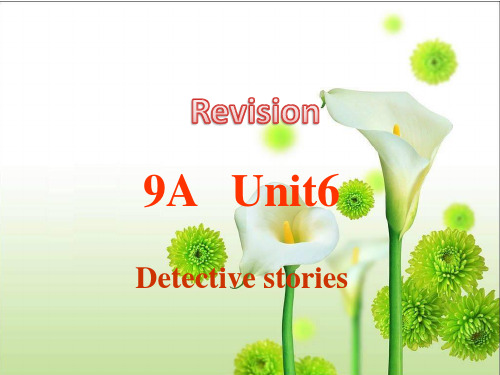
11.指纹 12.线索 13.敌人 14.几个 15.认为 16.呼吸 17.证明 18.反对 19.敢于
fingerprint clue enemy several suppose breathe prove against dare
20.安全 safety • 21.是否 If/whether • 22.抢劫 rob • 23.记录 record • 24.监狱 prison • 25.进口 import • 26.进步 progress • 27.老板 boss
She asked , ‘ When is he going there ?’
→ She asked when she was going there .
(4) 祈使句要变为ask / tell / order sb (not ) to do sth. The teacher said to the students , ‘ open your books .’ → The teacher asked the students to open their books . 2. 连接词后跟陈述句的语序 The man asks me , ‘Where do you live ?’ → The man asks me where I live . She asked the boy , “ Is it raining ?
→ He says that China is great .
(2)一般疑问句, 选择疑问句, 反意疑问句等用whether / if
He says, ‘ is Tom English ?’
→ He asked if / whether Tom is English .
(3)特殊疑问句用原来的疑问词(组)
Unit 6期末复习课件 2022-2023学年鲁教版(五四学制)八年级英语下册

1. 区分beside / besides beside: prep. 在…旁边; besides: prep. 除…之外(还) 2. stamp: n. 邮票,可数 (s)
collect stamps 3. rush v. / n.
rush to do sth / in a rush 4. address: n. e-mail address; home and address 5. polite / politely / impolite / impolitely 6. correct: adj. correctly adv.
用所给单词的适当形式填空
1. Could you please tell me when he _w_i_ll_l_ea_v_e_(leave) for Shanghai? 2. Could you please tell me where the post office _is_(be)? 3. I know who is _w_a_i_ti_n_g_ (wait) for you. 4. He doesn’t know how _t_o_u_s_e(use) the computer. 5. Mary asked if Lucy w__o_ul_d_a_r_r_iv_e__(arrive) on time this afternoon.
学生写出词义,词性
8. direction 9. correct 10. polite 11. direct 12. speaker 13. address 14. course
重点单词
1. There is a big store b_e_s_id_e__our community, and it’s very convenient for us. 2. He has collected s__ta_m__p_s_ since he was eight. 3. You may make more mistakes if you r_u_sh__to do things. 4. What’s your name and a_d_d_r_es_s_? 5. Please be p_o_li_te___ to your guests. 6. B_e_si_d_e_s_working as a doctor, he also writes novels in his spare time. 7. The c_o_rr_e_c_t_answer can be found at the bottom of page 8.
collect stamps 3. rush v. / n.
rush to do sth / in a rush 4. address: n. e-mail address; home and address 5. polite / politely / impolite / impolitely 6. correct: adj. correctly adv.
用所给单词的适当形式填空
1. Could you please tell me when he _w_i_ll_l_ea_v_e_(leave) for Shanghai? 2. Could you please tell me where the post office _is_(be)? 3. I know who is _w_a_i_ti_n_g_ (wait) for you. 4. He doesn’t know how _t_o_u_s_e(use) the computer. 5. Mary asked if Lucy w__o_ul_d_a_r_r_iv_e__(arrive) on time this afternoon.
学生写出词义,词性
8. direction 9. correct 10. polite 11. direct 12. speaker 13. address 14. course
重点单词
1. There is a big store b_e_s_id_e__our community, and it’s very convenient for us. 2. He has collected s__ta_m__p_s_ since he was eight. 3. You may make more mistakes if you r_u_sh__to do things. 4. What’s your name and a_d_d_r_es_s_? 5. Please be p_o_li_te___ to your guests. 6. B_e_si_d_e_s_working as a doctor, he also writes novels in his spare time. 7. The c_o_rr_e_c_t_answer can be found at the bottom of page 8.
Unit6复习课件 人教版八年级英语下册

单词拓展根据提示写出下列单词的变换形式1.gold n.金子; 金币 adj.金色的→ adj.金色的;金黄色的2. wife n.妻子;太 太→ (复数)3. lead v.带路;领路→ (过去式)→ n.领导 ;领袖4. brave adj.勇敢的;无畏的→ adv.勇敢地5. shine v. 发光;照耀→ (过去式)→ (现在分词)
1. so moved;take;away 2. It doesn't seem very possible to 3. This is because;turning;into
4. But he can hide his tail, he cannot himself a man.但是他不能把自己变成人,除非他能把尾巴藏起水。5. The new couple were happy they____ _____ _____when they _____ _____.
15.在其他时候
16.对某事有不同的观点
17.同意某人(的观点)
18.第一次
19.主要人物
20.确切地说;事实上;实际上
21.把某物放在······里面
22.看起来像
23.对······感兴趣
24.出版;发
行
27.从前
28.爱上
152.9a.t结ot婚her times 16. have different opinions about sth.17. agree with
sb.18. for the first time 19. the main character 20. in fact
21. keep sth. in……22. look like23. become interested in…24. come out 25. for many years
Unit 6(复习课件)五年级英语上册(译林版三起)

注意: 1.如果陈述句中有第一人称,则变问句时最好要变为第二人称。 例:I usually have lunch at school.
→Do you usually have lunch at school? 2.如果陈述句中有some, 则变问句时往往要变成any 。 例: There is some water on the playground.
注意: 1.如果陈述句中有第一人称,则变问句时最好要变为第二人称。 例:I usually have lunch at school.
→Do you usually have lunch at school? 2.如果陈述句中有some, 则变问句时往往要变成any 。 例: There is some water on the playground.
发这封电子邮件
5. eleven years old
11岁
7. swim well 8. study Chinese 9. what subjects 10. don't worry
中文 有语文课 游得好 学习语文 什么学科 别担心
短语
1. eat fish 2. go fishing 3. teach you 4. many fish 5. at school 6. in China
一般疑问句的综合复习 2) 当谓语动词是实意动词时,要借助助动词帮忙。 Tom likes animals. -----Does Tom like animals? (助动词好词做到底,即帮实意动词变一般疑问句,又帮实意动词把三单 提前,实意动词自己轻装上阵就可以。)
一般疑问句的综合复习 4.一般疑问句的回答: (1)当谓语动词部分是be动词或情态动词时,回答是要用be动词和情态动词本身 。 Is she a student? Yes, she is. / No, she isn’t. Can he swim? Yes, he can. / No, he can’t. (2)当谓语动词是实意动词时,要借助助动词帮忙。 Does Tom like animals? Yes, he does. / No, he doesn’t.
人教版英语九年级全册Unit6+复习课件
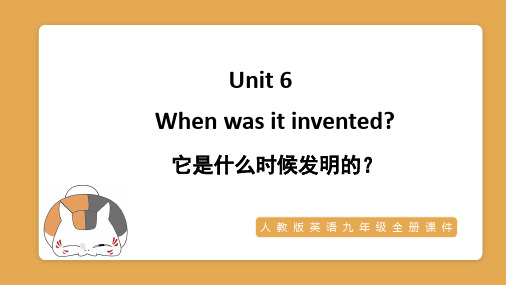
— ___D___. I suppose we shall have a wonderful night!
A. Never mind
B. Have a good time C. Not exactly
D. With pleasure
2. — He always appears to ___B____.
Roy: With pleasure! Let me think... hmm...I know! The zipper! Paul: The zipper? Is it really such a great invention? Roy: Think about how often it’s used in our daily lives. You can see zippers on dresses, trousers,
b c
a ____d_____ 1876
____a_____ 1885
d
____c_____ 1927
____b_____ 1971
1. No, we couldn’t afford one. 没有, 我们买不起。
Point afford / əˈfɔ:d/ v. 买得起; (有时间)做,能做; 承担得起(后果); 提供/给予
— That’s because he’s really knowledgeable and experienced.
A. make an effort
B. have a point C. pull together D. take place
3. — What did he say about his parents in his letter?
1. Well, you do seem to have a point... 好吧, 你说的似乎真的有道理
Unit6复习课件2021-2022学年人教版七年级英语下册
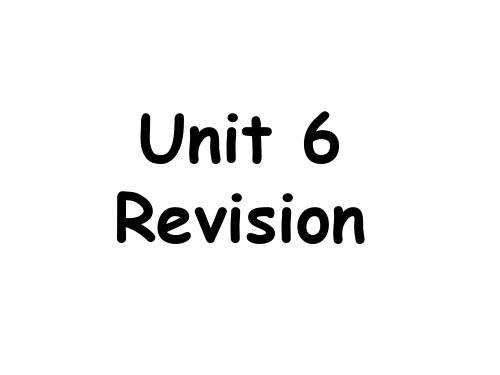
David: Hmm…and do you like _h__a_m_b_u_r_g_e_r_s_(hamburger) for lunch?
Cindy: Oh, no , they’re not _h_e_a_l_th_y_(health) I _l_ik_e_(like) chicken for dinner.
David: OK ,well, one last question--- do you eat ice-cream_a_f_te_r(…后)
dinner. Cindy: I like ice cream…but I d_o_n_’_t _ea_t (not eat) it. I don’t want __t_o_ _b_e__ (be)fat.
4. eat well
5. 考虑
5. think about
6. 吃早/午/晚饭
6. have
7. 体育明星
breakfast/lunch/dinner
8. 排球明星
7. sports stars
9. 问某人某事
8. the volleyball star
10. 喜欢汉堡包/冰淇淋 9. ask sb. about sth.
David _a_sk_s_(ask) the volleyball star, Cindy Smith, a_b__ou_ther _e_a_t_in__g (eat) habits.
David: Hello ,Cindy. What do you like __fo_r_ (对于…而言) breakfast? Cindy: I __lo_v_e__ (love)fruit . I think it’s_h_e_a_lt_h_y(health). David: OK . So what _f_r_u_it(fruit)do you like? Do you like bananas?
Cindy: Oh, no , they’re not _h_e_a_l_th_y_(health) I _l_ik_e_(like) chicken for dinner.
David: OK ,well, one last question--- do you eat ice-cream_a_f_te_r(…后)
dinner. Cindy: I like ice cream…but I d_o_n_’_t _ea_t (not eat) it. I don’t want __t_o_ _b_e__ (be)fat.
4. eat well
5. 考虑
5. think about
6. 吃早/午/晚饭
6. have
7. 体育明星
breakfast/lunch/dinner
8. 排球明星
7. sports stars
9. 问某人某事
8. the volleyball star
10. 喜欢汉堡包/冰淇淋 9. ask sb. about sth.
David _a_sk_s_(ask) the volleyball star, Cindy Smith, a_b__ou_ther _e_a_t_in__g (eat) habits.
David: Hello ,Cindy. What do you like __fo_r_ (对于…而言) breakfast? Cindy: I __lo_v_e__ (love)fruit . I think it’s_h_e_a_lt_h_y(health). David: OK . So what _f_r_u_it(fruit)do you like? Do you like bananas?
Unit 6(复习课件)英语三年级上册(人教PEP版2024秋)

Unit 6 Useful numbers
语音:字母Vv,Ww,Xx,Yy,Zz的字母发音以及在单词中的读音。
二级词汇:old(多少)岁;年纪;旧的 cut切块 o'clock(表示整点)…点钟
year年纪;年 cake 蛋糕 eat 吃
其他词汇:one一 five五 nine九
two二 six六 ten十
必会句型: 1.向他人介绍身边的人: —Binbin,this is my brother, Sam.斌斌,这是我的弟弟,萨姆。 —Hi,Sam! This is my sister, Xinxin.嗨,萨姆!这是我的妹妹,欣欣。 2.询问并回答年龄: —How old are you?你几岁了? —I'm five years old.我五岁了。 3.表达跟他人情况相同:Me too.我也是。
three三 seven七
four 四 eight八
常考短语:how old 几岁 me too 我也是 happy birthday生日快乐 what time...几点钟
...year(s)old…岁 jump up high 跳得高 one more cut再来一块 around the world 世界各地
【提分练】二、读一读,选择最佳答案。 ( )1. —__________ is your brother?
—He is three years old.
A.How many
B.Who
C. How old
[考点3]表达跟他人情况相同
Me too.我也是。
[考点4] 询问并回答个数
—How many apples?几个苹果? —Two.两个。
核心语法: 2.询问并回答数量 【结构】—How many+可数名词复数? —基数词。 【例句】—How many oranges?几个橙子? —Four; 四个。 —How many boys?几个男孩? —Ten.十个。
语音:字母Vv,Ww,Xx,Yy,Zz的字母发音以及在单词中的读音。
二级词汇:old(多少)岁;年纪;旧的 cut切块 o'clock(表示整点)…点钟
year年纪;年 cake 蛋糕 eat 吃
其他词汇:one一 five五 nine九
two二 six六 ten十
必会句型: 1.向他人介绍身边的人: —Binbin,this is my brother, Sam.斌斌,这是我的弟弟,萨姆。 —Hi,Sam! This is my sister, Xinxin.嗨,萨姆!这是我的妹妹,欣欣。 2.询问并回答年龄: —How old are you?你几岁了? —I'm five years old.我五岁了。 3.表达跟他人情况相同:Me too.我也是。
three三 seven七
four 四 eight八
常考短语:how old 几岁 me too 我也是 happy birthday生日快乐 what time...几点钟
...year(s)old…岁 jump up high 跳得高 one more cut再来一块 around the world 世界各地
【提分练】二、读一读,选择最佳答案。 ( )1. —__________ is your brother?
—He is three years old.
A.How many
B.Who
C. How old
[考点3]表达跟他人情况相同
Me too.我也是。
[考点4] 询问并回答个数
—How many apples?几个苹果? —Two.两个。
核心语法: 2.询问并回答数量 【结构】—How many+可数名词复数? —基数词。 【例句】—How many oranges?几个橙子? —Four; 四个。 —How many boys?几个男孩? —Ten.十个。
相关主题
